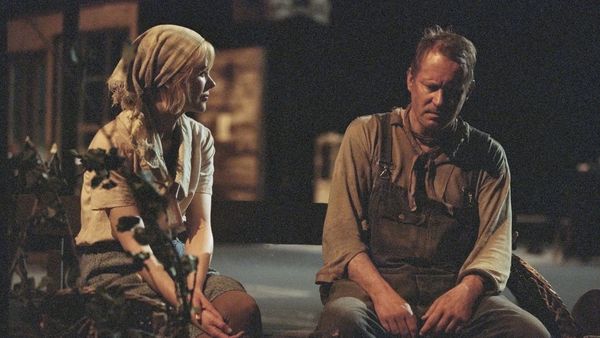Eye For Film >> Movies >> Dogville (2003) Film Review
Dogville
Reviewed by: Angus Wolfe Murray

Filmed theatre suffers crippling limitations. The camera's freedom is compromised. Pretension has neither nutrition, nor access. What remains are actors, words, stage decor and lights.
Lars Von Trier (Breaking The Waves, The Idiots) shoots this long and tragic tale entirely on a skeletal stage, where houses have no walls and the names of the streets are written in bold white paint on the wooden ground. The thought of spending three hours here, in a make-believe Rocky Mountain community, resembling nothing more than figures in a blandscape, is daunting.

There are many reasons why such a brave and original concept works so well. The narration, beautifully read by John Hurt, has the lilt and rhythm of Dylan Thomas, without the purple. Nicole Kidman, as the mysterious fugitive Grace, is luminous and breathtaking, capable of evoking strong emotions from the basis of an enigmatic outline.
Dogville should be an isolated, self-contained backwater of civilisation, poor white and trashed, not too distant from the hillbilly derelicts in Deliverance, a sewage pot of human detritus. In fact, it is nothing of the kind. It doesn't even feel American, or deprived. Tom (Paul Bettany), their spokesman, considers himself a philosopher, who gives lectures on matters of the day, encouraging democratic debate amongst all citizen of the little town.
Grace is on the run from gangsters. She appears out of the shadows one night, like an exotic creature from another stratosphere. Tom is smitten, naturally, and agrees to hide her from the men with guns when they drive up the mountain road in their crow black limousines, and later persuades the good citizens to give her shelter.
The film tells the story of Grace's stay in Dogville, how she befriends the inhabitants and finds work, helping them with family chores, or simple acts of kindness. At first, they appreciate her generousity, despite initial reservations, but slowly, inevitably, look upon her as something else, an object of secret depravity.
Von Trier's script dissects human nature and finds it deeply flawed, the first casualty being truth, the second self-awareness. Although written in the form of a fable and never realistic, if realism is measured by bricks and mortar, the motivation and behaviour of all concerned seems psychologically as accurate as a good German's refusal to believe that the Final Solution ever existed. It would not be difficult to interpret Dogville as an allegory for communal blindness in the face of atrocity.
Grace is the victim of her own honesty and yet, even she is not entirely blameless. What does that say for love, loyalty and largesse? Treat them with scepticism; treat them with respect. Contradiction, Von Trier implies, is the stuff of life.
Reviewed on: 13 Feb 2004


















